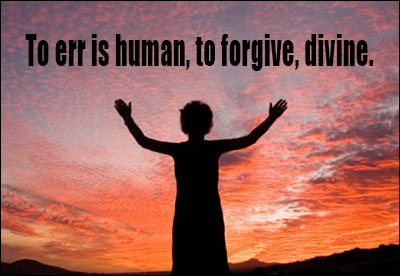
Why ‘Forgive and Forget’?
Everyone makes mistakes they wish they hadn’t. There is no person on earth who doesn’t have parts of their past that they wish they could forget. While we can’t always forget our errors, we can forgive ourselves for the things that we have done and their consequences. We can learn to forgive ourselves for the problems that we have encountered as a result of our own actions, and can we forget those issues that keep us up at night.
It is easy to forgive another person when they have caused us harm. We have been taught since infancy to empathize with others, so when we suffer as a result of another person’s actions, we find ways to justify our suffering and forgive them. This is not always a negative thing.
It is important and necessary that we learn to forgive, for the sake of others, and it is important that we learn to forget for our own sake. We need to understand that forgetting the problem does not necessarily mean that we have forgotten who caused the problem, nor does it mean we relinquish any claims to anger or sadness that we have following the situation. It means that we are taking the proactive steps in understanding that life will move on despite our suffering, and that if we do not make an attempt to reckon with those who have harmed us, and the feelings that accompany these pains, we will be left behind.
Already a master?
To some degree, we all do this on a daily basis. Someone cut you off in line at the subway turnstile on your way to work? You will most likely have forgotten the indiscretion by the time you enter your office. Do you hold vendettas against your siblings for each time they broke something of your as children? No? It is likely that you do not even recall many of these instances because you have already forgiven and forgotten them. The ease of “forgiving and forgetting” is entirely subjective in that it is dependent on the severity of the situation at hand. Variables such as what was lost and who is at fault play an important role in how quickly we are able to move forward. This process only becomes more complicated when we are the cause of the problem.
So what is the best thing to do?
Firs, we need to acknowledge and accept the problem. We need to understand the situation that we find ourselves in, and we need to accept our on fault in it. This is not always an easy task. Many times we may be harder on ourselves than we would be on another person. This is because where we can justify pain brought on by an external force by accepting the ambiguity in another person’s actions, we cannot always see the ambiguity in our own. Because we understand ourselves as individuals with agency, we consider the result of all of our reactions to be purposeful, even when they are not. We tend to forgive others before we are able to forgive ourselves. This is detrimental to a healthy relationship with ourselves.
“Forgiving yourself means first accepting that you committed an error, but secondly, refusing to condemn yourself totally for having made it.”
It is important to admit the gravity of the mistakes we have made. Forgiving ourselves does not mean lessening the severity of our error to make ourselves feel better. Admitting that we have messed up, be that slightly, or very very badly, is the first step toward improving the effects of the error. Forgiving yourself means accepting your human fallibility.
If you find that you are unable to forgive yourself, change your philosophy. Do not blame yourself for making a mistake. Accept your error-proneness. Acknowledge that perfection will not be attained. Renaissance philosopher and scientist Leonardo Da Vinci once spoke on this issue. “Life”, he said, “is pretty simple: You try something. Usually it fails. Sometimes it works. If it works well, others quickly copy it. Then you do something else. The trick is to keep trying something else.””
To learn more on the psychology of forgiving and forgetting, read this article from Psychology Today.

